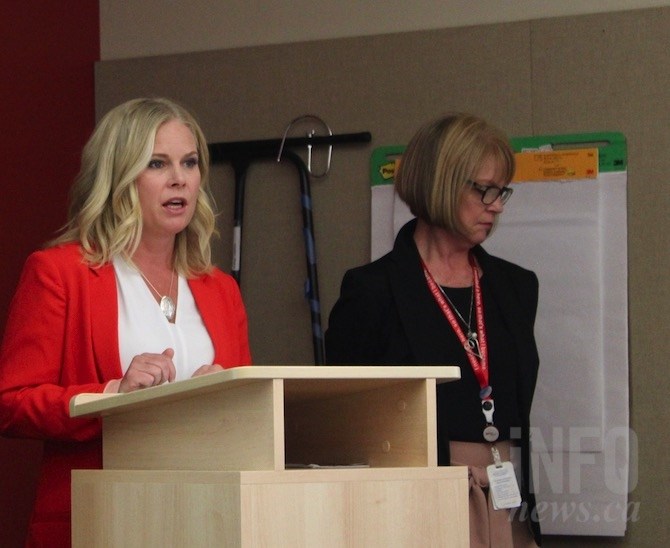
Danielle Cameron, left, and Deborah Preston, from Interior Health, speaking to Kelowna City Council on homelessness.
(ROB MUNRO / iNFOnews.ca)
June 10, 2019 - 6:00 PM
KELOWNA - While there is no simple solution to homelessness, getting family doctors on side is one key element that was stressed by Interior Health officials today, June 10.
But doctors also need training and support if they’re going to be part of the solution.
“Most family doctors are failures in dealing with addiction,” Coun. Charlie Hodge told three Interior Health officials who met with council for two hours to talk about ways to tackle homelessness.
“The (provincial) Primary Care Network is, basically, physician offices working together with a team of health care practitioners,” Deborah Preston, Community Health Service Administrator for Interior Health, told Hodge. “That’s the plan I’ve been working on."
“So, what else do they (doctors) need? Do they need social workers? Do they need nurses? Do they need mental health clinicians that are attached to their offices? Over the next year, we’re going to be working on exactly that. I think you’re right. The doctor can be an expert on only so many things. How do we help the physicians link their patients to the more expert services?”
What seems to be needed is a “nurse navigator,” she suggested.
But first, there have to be enough family doctors in the Central Okanagan so people in need can get an appointment. Hodge pointed out he has a doctor but it can take him weeks to get an appointment. So what hope does someone who is homeless have, he pondered.
It was clear from Preston’s comments that much more research needs to be done on things such as who is actually homeless and the ratio of family doctors to the local population compared to other cities (indications were that Kelowna lags behind).
Family doctors are so important because they are often the first line of communication for people with mental health and/or addiction problems.
“The first step in active, meaningful treatment is to access a clinician and to have someone to talk to who understands my needs,” Danielle Cameron, Mental Health and Substance Use Health Service Administrator, explained.
That sometimes comes with drug users talking to people working at the mobile safe injection site. Efforts are underway to set up a permanent safe injection site but the mobile unit will still be needed.
Interior Health’s Opioid Agonist program has been ramped up to the point where, if someone is ready to tackle their opioid addiction, they can get help with safe substitutes within 24 hours. But that only works for those looking for help.
“No one travels along a journey at the same pace,” Cameron said. “Some people come in and are ready in a very short period of time. Others can come in for a year and never be ready.”
The Interior Health region also has a low per capita ratio of treatment beds compared to other parts of the province.
While that’s important for people addicted to alcohol and some other substances, that’s not an issue for opioid addicts, Mental Health Officer Dr. Silvina Mema pointed out.
People addicted to opioids tend to fail if their first step is residential treatment, she said, noting that various substitute drugs are much more successful in treating the addictions by decreasing dependency on the illegal drugs.
Council wanted to get direction on what specific things they could lobby senior government for, on behalf of Interior Health.
There were no clear answers to that question but, just by having the discussion, the efforts are moving forward.
“When you ask questions and begin to outline what the problems are, then you look at accountability,” Mema said. “You spell out what the problems are and put them on the table.”
Today's discussion will lead to more data being collected and shared in an effort to find better ways to deal with homelessness in the city.
Mema expressed both optimism and pessimism in dealing with the issue. She talked about a doctor from Vancouver who spoke about a successful program there that's getting family doctors more involved in the solution. Then she pointed to all the visible homeless in Vancouver.
“Even that (effort) is not enough,” she said. “It makes me wonder if this problem can ever be solved.”
But, in the next breath, she was much more optimistic.
“As we move forward, I think great things are going to happen in Kelowna,” she said.
To contact a reporter for this story, email Rob Munro or call 250-808-0143 or email the editor. You can also submit photos, videos or news tips to the newsroom and be entered to win a monthly prize draw.
We welcome your comments and opinions on our stories but play nice. We won't censor or delete comments unless they contain off-topic statements or links, unnecessary vulgarity, false facts, spam or obviously fake profiles. If you have any concerns about what you see in comments, email the editor in the link above.
News from © iNFOnews, 2019